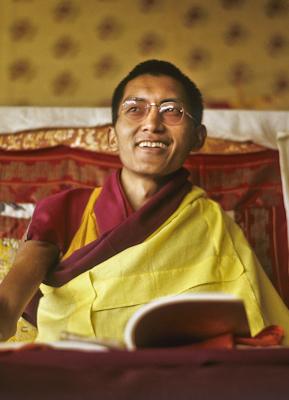If the desire clinging to the pleasure of this life is renounced, there is great peace in our mind and we don’t accumulate negative karma. The misery of our life and our bad reputation, all these things, are not experienced—they do not happen. As we start to renounce the evil thought of the eight worldly dharmas, the real happiness of our life starts.
Practicing Dharma means we renounce suffering. How? We renounce the cause of suffering and the problems of this life—the desires of this life, the eight worldly dharmas. This is actually practicing Dharma, pointing out the very essence, the root of the problems—the evil thought of the eight worldly dharmas. This is the essential practice.
The Kadampa geshes, those great, experienced meditators, advised that real happiness comes from renouncing the pleasures of this life. Real happiness is not being attached to our surroundings and our friends, and not being attached to receiving material things. If we renounce attachment to our friends, surroundings and helpers, the surroundings will come effortlessly and we will receive a helper naturally, due to the power of practicing Dharma.
Not being attached to receiving material things is the best attainment. When we are attached and we seek material pleasures, they are very hard to find, but when we renounce attachment, material things come naturally without much effort. The best attainment isn’t receiving material things, it is enlightenment, and by renouncing attachment to receiving material things, we can accomplish enlightenment. Ultimate happiness is the best attainment, besides this temporal happiness.
Not desiring a reputation is the best reputation, for example, the great yogi Milarepa, Lama Tsongkhapa and Guru Shakyamuni Buddha. All these great pandit yogis had such amazing reputations that everyone who saw them prostrated with devotion and made offerings, just by seeing their names. They acquired a good reputation by renouncing attachment to their reputation.
This happened without purposely working or concentrating on gaining a reputation, like a worldly person who spends so much time to gain a reputation and a position. If we want to get the position of president or something, we spend a lot of time and material expenses trying to gain a reputation. We spend millions and millions of dollars to get a good reputation, but it is difficult to become successful.
Similarly, Geshe Sharawa, the great Kadampa meditator, from his experience said that knowing the very essence of what we call Dharma is very important. Renouncing suffering and the eight worldly dharmas is something we should keep in our heart. Then, when we hear, “I’m practicing Dharma,” it makes a lot of sense and it has great meaning.
Guru Shakyamuni Buddha said in the sutra teachings that if we wish for all happiness and renounce all our attachment, we will achieve the supreme happiness of enlightenment. As long as we follow attachment, we are never satisfied, but by following Dharma wisdom, we will become satisfied and have great happiness.
However, without taking this advice, with our dissatisfied mind it’s like we are drinking salt water. In India there is salty popcorn, and because it is salty we have to drink tea with it. So, we eat the salty popcorn and then we drink a glass of tea, and again we eat popcorn and again it makes us drink one more tea. Then we eat more and then again it makes us drink more tea. So like this, it makes us drink more and more until we stop. There is no end to it.
Real happiness and peace of mind in our life starts with renunciation. Real renunciation and peace of mind starts whenever we start to practice renouncing the desire of this life. So, there are two things— our practice of the holy Dharma and renouncing the evil thought of the eight worldly dharmas. Renouncing the holy Dharma and renouncing the works of the evil thought of the eight worldly dharmas—these two things are completely opposite.
We can do both, but not at the same time. One action cannot become both. One action cannot become holy Dharma and worldly dharma, the works of the evil thought dharma. One action cannot become both—they are completely opposite and if we try to do them together, we lose the holy Dharma. If we do not renounce the eight worldly dharmas—the clinging to this life—it is difficult even to stop our rebirth in the lower realms, and it is difficult for the Dharma to become the path to nirvana. It’s very difficult.
Read more from Lama Zopa Rinpoche on renouncing the eight worldly dharmas.





























